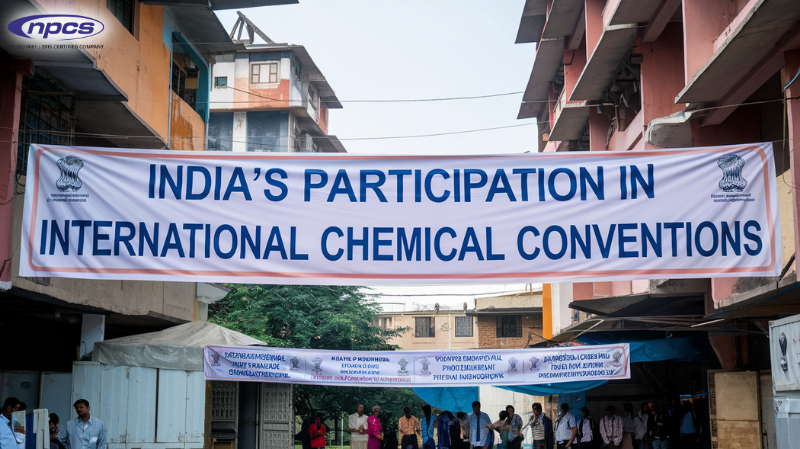India carries out active engagement at the global level towards rational management of global chemicals and environmental protection. The nation is a party to a number of important international instruments, such as the CWC, the Rotterdam and Stockholm Conventions. People have established these treaties to recognize the need to control and manage global chemical hazards from regulated use to safe disposal and to promote and protect the environment.
One can argue that India’s participation in these conventions demonstrates not only its dedication to universal disarmament and helping the environment, but also stresses the country’s leadership in the global governance of chemical safety. All of these conventions have their own specific agendas, but they are all concerned, to a greater or lesser degree, with the issues of public health and environmental protection from the negative effects of dangerous chemicals.
Chemical Weapons Convention (CWC)
The Chemical Weapons Convention (CWC) was the first treaty to require states to destroy an entire class of weaponry and provide the means to verify that destruction. The CWC was ushered in by the Organization for the Prohibition of Chemical Weapons (OPCW) that was created to promote the objectives of the convention, ensure adherence, and seek disarmament of chemical arms globally.
Signatory Status
India signed the CWC on January 14, 1993, and deposited its instrument of ratifications on September 3, 1996 cementing its stand on non-proliferation and chemical disarmament. India was among the countries that accumulated chemical weapons under the OPCW and completed all processes including destruction by 2009.
Legislation
To meet its global obligations under the CWC, India passed the Chemical Weapons Convention Act, 2000. This act defines the country’s obligations in view of the system and provides the structure for its enforcement. It embraces a regime that comprehensively regulates substances that may be applied in the improvement of chemical weapons, whilst making sure that legitimate businesses that use such substances are not compromised.
Join With Us
Administrative Department
The implementation of the CWC is carried out by the Department of Chemicals & Petrochemicals within the Ministry of Chemicals and Fertilizers in India. The department holds an important position in facilitating India’s compliance with chemical weapons disarmament and nonproliferation.
National Authority
In order to address the provisions of CWC, India created the National Authority for Chemical Weapons Convention (NACWC). The NACWC is concerned with all matters pertaining to chemical weapons and responsible for ensuring that India respects the provisions of the treaty. Promoting adherence and understanding, the authority engages in industries, research agencies and other relevant parties as well.
Chemical Schedules
The CWC arranges three schedules of chemicals according to whether manufacturers may use them in making global chemical weapons or not:
Schedule 1: People usually use these as the chemical weapons in question or find very few other acceptable uses for them.
Schedule 2: Manufacturers use these as chemical weapon dosage forms and for some innocent improved industry uses, but authorities must highly control them.
Schedule 3: Industries apply these chemical substances for industrial purposes, but people may also use them in making chemical warfare agents.
India strictly regulates these chemicals to ensure that they are not diverted for harmful purposes while allowing their use in peaceful and industrial applications.
India’s Contribution to Global Disarmament
The process of demolishing the stockpile of chemical weapons held by India was an essential step that showcased India’s dedication to the cause of disarmament. In the present day, India seeks to keep its non-chemical weapon state credentials intact and continues to cooperate with the OEWG on the issue of chemical weapon elimination.
Rotterdam Convention
Governments promote Conventions on the International Trade in Hazardous Chemicals and Disposal through Regulation – The Rotterdam Convention establishes a global framework to enhance the collective and individual responsibility in the commerce of some potentially toxic manufactured products. It aims to safeguard the health of individuals and the ecosystem by ensuring that nations receive adequate data, enabling them to decide whether to import or export any dangerous substances.
Adoption and Accession
The Rotterdam Convention was opened for signature on 10th September 1998 and India ratified it on 24th May 2006. Since then, the country has taken active measures in its enforcement, promoting appropriate trade of dangerous substances with due cognizance of their hazards.
Objective
Amongst other things that the Rotterdam Convention seeks to address, one of the main aims is to ensure that people concerned with the trade in hazardous chemicals and pesticides are able to make an informed decision regarding the import or export of these substances. It does this in turn by obligating the exporting nations to supply adequate information concerning the chemicals in trade, while at the same time, allowing the importation countries to either allow or block the importation of such shipment in accordance with their environmental and health policies.
Related Feasibility Study Reports: Chemicals (Organic, Inorganic, Industrial) Projects
National Authority
In India, the Department of Chemicals and Petrochemicals also acts as the Designated National Authority (DNA) for industrial chemicals, as per the provisions of the Rotterdam Convention. It deals with notifications regarding the control of use and trade of harmful chemicals within the country.
India’s Role
The Rotterdam Convention has welcomed India as one of its active members and the country has been canceling notifications on the importation of controlled chemicals since this treaty came into effect. By regulating the imports and exports of certain products particularly focused on hazardous chemical compounds, the country strives to play its part towards the decreasing of chemical threats and environmental conservation as a whole. Furthermore, the mechanisms of regulation within the country reinforce this, which ensure, for instance, control over the process of importing and exporting these chemicals to prevent any risk to public health and to the environment itself.
Stockholm Convention
The objective of the Stockholm Convention is to control or eradicate the toxic and environmental persistent organic pollutants (POPs). These are harmful and toxic compositions, which in a matter of not less than a few decades refuse to disintegrate in environmental conditions. Such POP bioavailability risks associated with the food chain lead to threat towards human and environmental safety.
Ratification
On January 13, 2006, India signed the instrument of ratification for the Stockholm Convention. In the period since then, the country has also made a considerable distance in controlling the pollution caused by POPs and bringing that in accordance with. the international practices and order levels of these hazards.
Objective
The purpose of the Stockholm Convention is an overall ban or limitation on production and use of POPs thanks to their adverse effects on human health and the environment. Some of these agents are also known as carcinogenic, neurotoxic, or even reproduce and immuno injurious to human and animal species.
Implementation Support
India undertakes all measures to implement the Stockholm Convention thanks to the technical and financial support from a number of international organizations such as the Global Environment Facility (GEF). Thanks to this assistance, India has been able to establish and sustain the capacity to control POPs in the country within the global environmental framework.
Special Considerations
One of the significant aspects of the Stockholm Convention is DDT use. India no longer allows agricultural use of DDT, but still provides a few limited exemptions for vector control measures (particularly, those measures that manage malaria-carrying mosquitoes). This underlines a very balanced way of looking at the issue, giving precedence to the protection of the people rather than the environment.
India’s Efforts to Control POPs
As part of its proactive policy, India has worked to phase out the use of some POPs and also to control the use of some others. This includes control and supervision of the factories that manufacture or use the chemicals that are within the scope of the convention and support of less toxic alternatives.
Conclusion
India’s involvement in the Chemical Weapons Convention (CWC) in addition to the Rotterdam and the Stockholm Conventions. It prove that India pays serious attention to global health and environmental issues, chemical safety in particular. In this way, by combining the impacts of the chemicals conventions, India is not only concerned about the international concern of chemical management. But also promoting its level of environmental and people health preservation.
By careful formulation and implementation of appropriate legislation at the national level, participation in various activities and events at the international level, as well as chemical safety measures in India get better and better every day, the country also participates in chemical safety governance at the global level. In the years to come, even as the country develops and industrializes, its participation in international treaties will be critical for the wellbeing of its people and for the world as a whole.






